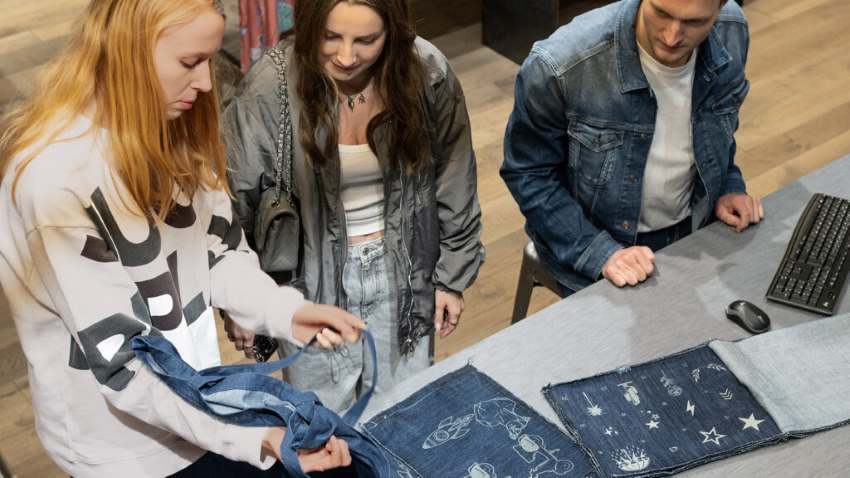
At a time where individuality and self-expression reign supreme, the denim and jeanswear industry is witnessing an unprecedented shift toward customization, do-it-yourself (DIY) fashion, and on-demand production. Consumers are no longer satisfied with off-the-rack designs; they want to infuse their personality into their wardrobes, and denim—known for its versatility and timeless appeal—has become the ultimate canvas for creativity, tailored to their exact specifications.
The rise of customization, DIY, and on-demand in denim
Denim has long been a staple in wardrobes worldwide, but the demand for personalized, bespoke, and instantly produced jeanswear has skyrocketed in recent years. From embroidered patches to hand-painted designs, distressed treatments, and custom fits, denim enthusiasts are embracing DIY techniques and on-demand services to create one-of-a-kind pieces. This trend got a boost from social media platforms like Instagram, Pinterest, and TikTok, where influencers and designers showcase their customized creations, inspiring millions to experiment with their jeans. Moreover, online tutorials on platforms like YouTube and Instagram provide a vast library of inspiration for everyday consumers. The rise of e-commerce has been pivotal in facilitating this trend, providing accessible platforms for both consumers and independent creators.
The power of on-demand
The “on-demand” aspect is a game-changer. It allows for production only when an order is placed, eliminating excess inventory and significantly reducing waste. This approach aligns perfectly with the growing demand for sustainable fashion. It also allows for extremely high levels of personalization, allowing for custom measurements, and designs.
Brands adapting to customization wave
Recognizing the growing demand for personalization and on-demand production, major denim brands are integrating customization services into their offerings. Levi’s, for instance, has grown its ‘Tailor Shop’ concept globally, allowing customers to personalize their jeans with patches, monograms, and unique embroidery. They are also moving towards more on-demand models. This initiative not only increases customer engagement but also promotes sustainability, as consumers are encouraged to repair and upcycle their denim instead of discarding it. Levi's is also exploring and implementing on-demand production to reduce waste and cater to specific customer needs quickly. Similarly, Diesel and Wrangler have introduced customization studios where consumers can distress, paint, and add embellishments to their denim, ensuring a truly unique product.
Smaller, independent denim brands are also capitalizing on this trend. Companies like Unspun, which uses 3D technology to create custom-fit, on-demand jeans, and Blank NYC, which offers hand-painted denim jackets, are revolutionizing the industry by prioritizing individuality and immediate production over mass production. Unspun, the San Francisco-based startup, has taken denim customization to the next level by leveraging AI and 3D scanning technology to create jeans that are made-to-order for each customer. This process eliminates excess inventory, reducing waste while ensuring a perfect fit. The brand’s commitment to sustainability, personalization, and on-demand production has attracted eco-conscious consumers looking for both style and ethical fashion choices.
The DIY culture and e-commerce in denim’s evolution
Beyond brand-driven customization, DIY denim culture is thriving among fashion enthusiasts who prefer to take matters into their own hands. Thrift flipping—where vintage denim is upcycled into trendy new designs—has gained immense popularity, particularly among Gen Z consumers who value sustainability and individuality. Online marketplaces like Depop and Etsy have become hubs for one-of-a-kind, hand-altered denim pieces, boosting the trend. E-commerce platforms have democratized access to materials and tools, making DIY customization more accessible than ever.
Workshops and community events are also playing a crucial role in fostering DIY denim culture. Local designers and artists host denim customization workshops, teaching participants techniques such as bleaching, hand-painting, and distressing. These events not only encourage creativity but also promote sustainable fashion practices by extending the lifecycle of denim garments.
Sustainability and the future of customization
Customization and on-demand production are not just about aesthetics—they are also reshaping the denim industry’s approach to sustainability. Mass production contributes significantly to environmental degradation, with denim manufacturing being one of the most resource-intensive processes in the fashion industry. By enabling consumers to create personalized pieces and producing only what is needed, brands are fostering a culture of conscious consumption, where individuals are more likely to cherish and retain their customized jeans for years.
Moreover, the growing popularity of upcycling and repair services aligns with the global push for sustainability. Companies like Nudie Jeans have pioneered free repair programs, encouraging customers to extend the lifespan of their denim rather than discarding it. As more brands adopt similar initiatives, customization and on-demand production will play a pivotal role in reducing fashion waste and promoting a more circular economy.
Thus the shift towards DIY, customization, and on-demand production in the denim and jeanswear segment is more than just a passing trend—it is a movement that reflects broader consumer values of self-expression, sustainability, and uniqueness. As technology continues to evolve, and as consumers seek greater control over their fashion choices, the industry will likely see further innovations in customization and on-demand services. Whether through high-tech personalization services, hands-on DIY approaches, or instant production, one thing is clear: the future of denim is personal, sustainable, and produced on demand. E-commerce has been, and will continue to be, a key driver in this evolution.












